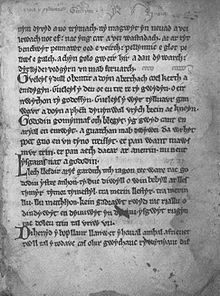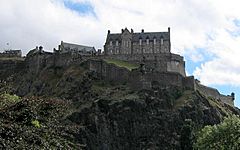Y Gododdin facts for kids
Quick facts for kids Y Gododdin |
|
|---|---|

Page from the Book of Aneirin, showing the first part of the text added by Scribe B
|
|
| Author(s) | anonymous |
| Ascribed to | Aneirin |
| Language | Old Welsh and Middle Welsh |
| Date | disputed (7th–11th century) |
| Manuscript(s) | Book of Aneirin (second half of the 13th century) |
| Genre | heroic and elegiac poetry |
| Setting | especially Mynyddog's feasts at Din Eidyn and the disastrous battle at Catraeth |
| Period covered | Hen Ogledd |
| Personages | include Mynyddog Mwynfawr |
Y Gododdin (Welsh: [əː ɡɔˈðɔðɪn]) is a very old Welsh poem. It is a collection of sad songs, called elegies. These songs remember the brave warriors from the ancient kingdom of Gododdin and their friends.
According to the poem, these warriors died fighting against the Angles. The battle happened around the year 600 AD at a place called Catraeth. People believe the poem was written by a bard named Aneirin. Today, we only have one copy of it, found in a book called the "Book of Aneirin".
The Book of Aneirin was written in the late 1200s. However, Y Gododdin itself might be much older. Some experts think it was first created between the 600s and early 1000s. If so, it would be one of the oldest surviving Welsh poems. It was likely first spoken or sung in the "Hen Ogledd" (meaning "Old North"), which was a part of Britain long ago.
The Gododdin people, also known as the Votadini in Roman times, lived in what is now southeast Scotland and Northumberland. The poem tells how their ruler, Mynyddog Mwynfawr, gathered a force of 300 (or 363) skilled warriors. Some came from far away, like Pictland and Gwynedd.
After a year of feasting at Din Eidyn (which is now Edinburgh), they attacked Catraeth. Catraeth is usually thought to be Catterick in North Yorkshire. The poem describes how, after several days of fighting against many more enemies, almost all the warriors were killed. The poem is like a heroic story, focusing on the bravery of the heroes. It is not a detailed story of the battle itself.
The old book also contains some parts that don't seem to be connected to the main poem. These are called "interpolations" (things added later). One part is special because it mentions King Arthur. If this part was in the original poem, it would be the earliest known mention of King Arthur!
Contents
The Book of Aneirin
The Manuscript
We only know of one old copy of Y Gododdin. It is in the Book of Aneirin, which was likely written in the second half of the 1200s. Experts believe two different scribes (people who copied texts) worked on this book. They are called Scribe A and Scribe B.
Scribe A copied 88 parts of the poem. Then, Scribe A left a blank page and copied four other related poems. Scribe A wrote using a style called Middle Welsh writing. Scribe B added more parts later. It seems Scribe B had an even older copy of the poem. This is because Scribe B's writing uses an older style called Old Welsh.
Scribe B copied 35 parts. Some of these were different versions of parts Scribe A had already copied. Others were new. The very last part is not finished. Also, three pages are missing from the end of the book. This means some of the poem might be lost forever.
The Poem's Story

The poem is made up of many parts, each a sad song for warriors who died in battle. They fought against a much larger enemy force. Some parts of the poem talk about the whole group of warriors. Other parts praise individual heroes.
The poem tells how Mynyddog Mwynfawr, the ruler of the Gododdin, brought together warriors. These warriors came from different Brittonic kingdoms. He gave them a year of feasting and drinking mead (an alcoholic drink made from honey) in his halls at Din Eidyn. After this, they started a war. Almost all of them were killed fighting against huge numbers of enemies.
The poem uses a fixed number of syllables in each line. It also uses rhyme, both at the end of lines and within them. Some parts use alliteration (words starting with the same sound). Many parts of the poem begin with the same words. For example, "Gwyr a aeth gatraeth gan wawr" means "Men went to Catraeth at dawn".
The collection seems to have come from two different versions of the story. Some parts say there were 300 Gododdin men, and only one, Cynon ap Clydno, survived. Other parts say there were 363 warriors and three survivors. The poet, who was a bard, would not have been counted as a warrior. The poem names about 80 different warriors.
The Book of Aneirin starts with the words "Hwn yw e Gododin. Aneirin ae cant". This means "This is the Gododdin; Aneirin sang it". One part, which is at the beginning of Scribe B's text, seems to be a speaker's introduction:
|
Gododin, gomynnaf oth blegyt |
Gododdin, I make claim on thy behalf |
Mead is mentioned often in the poem. Sometimes, it suggests that drinking mead led to their deaths. The warriors were expected to be loyal to their lord until death. This was how they "paid their mead". This idea is also found in old Anglo-Saxon poems.
The heroes in the poem were warriors who rode horses. The poem often talks about horses. It also mentions spears, swords, and shields. It talks about them wearing armour. The poem suggests they were Christians, mentioning "penance" and "altar". Their enemies are called "heathens". However, some experts think the Christian parts might have been added later.
Many personal names are given in the poem. Only two of these names are found in other old writings. One warrior was Cynon ap Clydno. He is mentioned in old family records. The other name is Arthur. If the mention of Arthur was in the original poem, it would be the earliest reference to Arthur. He is shown as a symbol of great bravery.
Many warriors were not from the Gododdin lands. Some places mentioned include Aeron, near the River Ayr. Also Elfed, which is the area around Leeds today. Others came from even further away. One warrior came from "beyond Bannog," which refers to mountains between Stirling and Dumbarton. This warrior must have come from Pictland. Others came from Gwynedd in north Wales.
Added Parts (Interpolations)
Some parts in the Book of Aneirin manuscript do not connect to the main poem. They are about southern Scotland or northern England, not Wales.
Another part seems to be from a different group of poems. These poems are about Llywarch Hen. A third added part is a poem called "Dinogad's Smock". This is a lullaby (a song for a baby) for a baby named Dinogad. It describes his father hunting and fishing.
These extra parts were likely added to the poem after it was first written down. They might have been copied into blank spaces in the manuscript. Later, someone copying the poem again might have included them by mistake. They didn't realize these parts didn't belong.
Editions and Translations
The first known translation of Y Gododdin was by Evan Evans. He printed ten parts with a Latin translation in 1764. The full poem was first printed by Owen Jones in 1801.
Later, English translations were published by William Probert in 1820 and by John Williams in 1852. More translations followed, including by William Forbes Skene in 1866 and Thomas Stephens in 1888. Gwenogvryn Evans made a copy of the Book of Aneirin in 1908. He also made an edition with a translation in 1922.
The first truly reliable edition was Canu Aneirin by Ifor Williams in 1938. New translations based on this work came out later. These include one by Kenneth H. Jackson in 1969. Another was by A. O. H. Jarman in 1988, with updated Welsh text. A color copy of the manuscript was published in 1989. John T. Koch's new edition, which tried to recreate the original text, came out in 1997.
Many translations also try to show Y Gododdin as a work of literature. They are not just for scholarly study. Examples include Joseph P. Clancy's translation in 1970 and Steve Short's in 1994.
Cultural Influence
Y Gododdin has been important in later Medieval Welsh poetry. For example, the 12th-century poem Hirlas Owain by Owain Cyfeiliog praises his own warriors. It compares them to the heroes of the Gododdin. It also uses Y Gododdin as a guide for its own style.
A poet named Dafydd Benfras wished to be inspired "to sing as Aneirin sang / The day he sang the Gododdin". This was in a poem praising Llywelyn the Great. After this time, the poem seemed to be forgotten in Wales for centuries. Then, Evan Evans found the manuscript in the late 1700s. From the early 1800s, many Welsh poems started to mention Y Gododdin again.
In English, Y Gododdin greatly influenced the long poem In Parenthesis (1937) by David Jones. In his poem, Jones wrote about the terrible events he saw in the First World War. He put a quote from Y Gododdin at the start of each of his poem's seven parts.
Another English poet, Richard Caddel, used Y Gododdin for his poem For the Fallen (1997). He wrote it to remember his son Tom. Tony Conran's poem Elegy for the Welsh Dead, in the Falklands Islands, 1982 starts with "Men went to Catraeth". He used the old poem to comment on a modern war.
The poem's theme and rhythm also inspired Owen Sheers's Pink Mist (2012). This is a long, sad poem for soldiers who died or were hurt in Afghanistan. The poem was based on interviews with soldiers. It was first made for radio and then became a stage play.
Y Gododdin has also inspired several historical novels. These include Men Went to Cattraeth (1969) by John James. Also, The Shining Company (1990) by Rosemary Sutcliff. And The Amber Treasure (2009) by Richard J Denning.
In 1989, the British band Test Dept. released an album called Gododdin. They set the words of the poem to music. Some parts were in the original language, and some in English. This was a project with the Welsh theater group Brith Gof. They performed it in Wales and other European countries.
 | Delilah Pierce |
 | Gordon Parks |
 | Augusta Savage |
 | Charles Ethan Porter |

